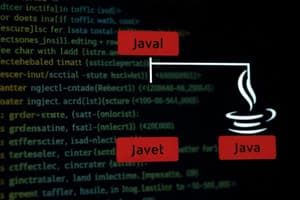Podcast
Questions and Answers
Which method is used to check if a file exists in Java?
Which method is used to check if a file exists in Java?
- fileExists()
- isFile()
- exists() (correct)
- isExist()
Which class is utilized for file creation in Java?
Which class is utilized for file creation in Java?
- File (correct)
- FileInputStream
- FileReader
- FileWriter
What is the correct method to create a new file in Java?
What is the correct method to create a new file in Java?
- makeFile()
- createNewFile() (correct)
- createFile()
- newFile()
Which method can be used to delete a file in Java?
Which method can be used to delete a file in Java?
What exception occurs when attempting to read a non-existent file in Java?
What exception occurs when attempting to read a non-existent file in Java?
What is the main purpose of inheritance in Java?
What is the main purpose of inheritance in Java?
Which keyword is specifically used for creating a subclass in Java?
Which keyword is specifically used for creating a subclass in Java?
Which of the following describes what a subclass can inherit from a superclass in Java?
Which of the following describes what a subclass can inherit from a superclass in Java?
Which of the following statements regarding the inheritance model in Java is true?
Which of the following statements regarding the inheritance model in Java is true?
What is the correct method of invoking a superclass constructor within a subclass in Java?
What is the correct method of invoking a superclass constructor within a subclass in Java?
Regarding method overriding in Java, what is accurately described?
Regarding method overriding in Java, what is accurately described?
What can be inherited by subclasses in Java?
What can be inherited by subclasses in Java?
Can a subclass in Java override a private method present in its superclass?
Can a subclass in Java override a private method present in its superclass?
What will be the output of the following code snippet?
class Parent {
void display() {
System.out.println("Parent class");
}
}
class Child extends Parent {
void display() {
System.out.println("Child class");
}
}
public class Main {
public static void main(String[] args) {
Parent obj = new Child();
obj.display();
}
}
What will be the output of the following code snippet?
class Parent {
void display() {
System.out.println("Parent class");
}
}
class Child extends Parent {
void display() {
System.out.println("Child class");
}
}
public class Main {
public static void main(String[] args) {
Parent obj = new Child();
obj.display();
}
}
What happens if a subclass does not provide a constructor?
What happens if a subclass does not provide a constructor?
Can a subclass call a private method of its superclass?
Can a subclass call a private method of its superclass?
What is the superclass of all classes in Java?
What is the superclass of all classes in Java?
Which of the following allows for runtime polymorphism in Java?
Which of the following allows for runtime polymorphism in Java?
What is the purpose of method overriding in object-oriented programming?
What is the purpose of method overriding in object-oriented programming?
Which access modifiers can be used for a method in a superclass so that it can be overridden by a subclass?
Which access modifiers can be used for a method in a superclass so that it can be overridden by a subclass?
What does the keyword 'final' signify in relation to methods in Java?
What does the keyword 'final' signify in relation to methods in Java?
What will happen if you override a method with a different return type?
What will happen if you override a method with a different return type?
What is true about the constructors in abstract classes?
What is true about the constructors in abstract classes?
Can we override the constructor in Java?
Can we override the constructor in Java?
What does the super keyword refer to?
What does the super keyword refer to?
What is the result of trying to call an instance method on a null reference in Java?
What is the result of trying to call an instance method on a null reference in Java?
What can be inferred about Vehicle v = new Car(); v.run(); in the given code snippet?
What can be inferred about Vehicle v = new Car(); v.run(); in the given code snippet?
Can a subclass access the private variables of its superclass in Java?
Can a subclass access the private variables of its superclass in Java?
What happens if a subclass does not override an abstract method?
What happens if a subclass does not override an abstract method?
Which of the following can be inherited by a subclass?
Which of the following can be inherited by a subclass?
Can an abstract class implement an interface?
Can an abstract class implement an interface?
What is the keyword used to declare an interface in Java?
What is the keyword used to declare an interface in Java?
In Java, what does the term 'multiple inheritance' refer to?
In Java, what does the term 'multiple inheritance' refer to?
Can a class implement multiple interfaces in Java?
Can a class implement multiple interfaces in Java?
What is a subclass in Java?
What is a subclass in Java?
What is a key characteristic of a final class in Java?
What is a key characteristic of a final class in Java?
What exception type does Java throw when trying to read from a non-existent file?
What exception type does Java throw when trying to read from a non-existent file?
Which of the following statements about interfaces in Java is true?
Which of the following statements about interfaces in Java is true?
What can a subclass not do regarding protected members inherited from the superclass?
What can a subclass not do regarding protected members inherited from the superclass?
What keyword is used to denote a method that cannot be implemented in the current class?
What keyword is used to denote a method that cannot be implemented in the current class?
Flashcards
Java Inheritance
Java Inheritance
A mechanism in Java for creating a new class from an existing one, inheriting its properties and methods.
Inheritance Keyword
Inheritance Keyword
The keyword 'extends' is used to inherit from a class in Java.
Purpose of Inheritance
Purpose of Inheritance
The primary purpose is code reuse and creating an efficient structure by deriving from an existing class.
Inheritance Syntax
Inheritance Syntax
Signup and view all the flashcards
Inherited Components
Inherited Components
Signup and view all the flashcards
Multiple Inheritance
Multiple Inheritance
Signup and view all the flashcards
Superclass of Object Class
Superclass of Object Class
Signup and view all the flashcards
Inheritable Components (Methods and Variables)
Inheritable Components (Methods and Variables)
Signup and view all the flashcards
Method Overriding restrictions
Method Overriding restrictions
Signup and view all the flashcards
Method Overriding
Method Overriding
Signup and view all the flashcards
Calling Superclass Constructor
Calling Superclass Constructor
Signup and view all the flashcards
Checking if a file exists in Java
Checking if a file exists in Java
Signup and view all the flashcards
Getting a file's size in Java
Getting a file's size in Java
Signup and view all the flashcards
Creating a file in Java
Creating a file in Java
Signup and view all the flashcards
Creating a new file in Java
Creating a new file in Java
Signup and view all the flashcards
Deleting a file in Java
Deleting a file in Java
Signup and view all the flashcards
Subclass in Java
Subclass in Java
Signup and view all the flashcards
Superclass in Java
Superclass in Java
Signup and view all the flashcards
Runtime Polymorphism
Runtime Polymorphism
Signup and view all the flashcards
Inheritance in Java
Inheritance in Java
Signup and view all the flashcards
super keyword
super keyword
Signup and view all the flashcards
Constructors in Java
Constructors in Java
Signup and view all the flashcards
Private Method Inheritance
Private Method Inheritance
Signup and view all the flashcards
Final Method
Final Method
Signup and view all the flashcards
Object Class
Object Class
Signup and view all the flashcards
Static Method Inheritance
Static Method Inheritance
Signup and view all the flashcards
Access Modifiers
Access Modifiers
Signup and view all the flashcards
Interface in Java
Interface in Java
Signup and view all the flashcards
Method overriding in Java
Method overriding in Java
Signup and view all the flashcards
super() constructor
super() constructor
Signup and view all the flashcards
Abstract class in Java
Abstract class in Java
Signup and view all the flashcards
Final class in Java
Final class in Java
Signup and view all the flashcards
Multiple inheritance through classes
Multiple inheritance through classes
Signup and view all the flashcards
Implementing interface methods
Implementing interface methods
Signup and view all the flashcards
Abstract method in Java
Abstract method in Java
Signup and view all the flashcards
final method in Java
final method in Java
Signup and view all the flashcards
createNewFile() method
createNewFile() method
Signup and view all the flashcards
delete() method
delete() method
Signup and view all the flashcards
FileNotFoundException
FileNotFoundException
Signup and view all the flashcards
Calling a superclass method
Calling a superclass method
Signup and view all the flashcards
NullPointerException
NullPointerException
Signup and view all the flashcards
Study Notes
Java Inheritance
- Inheritance: A mechanism for creating new classes (subclasses) based on existing classes (superclasses), enabling code reuse.
- Keyword for Inheritance:
extends - Purpose of Inheritance: Primarily for code reuse, enabling subclasses to inherit methods and variables from superclasses.
- Syntax for Inheritance:
class Subclass extends Superclass - Inherited Members: Subclasses inherit both methods and variables from their superclasses.
- Single Inheritance (Java): A class can inherit from only one superclass.
- Superclass of all classes: The
Objectclass. - Method Overriding: A subclass providing its own implementation of a method already present in its superclass.
- Calling Superclass Constructor:
super()is used in a subclass's constructor to invoke the superclass's constructor. - Default Constructor: If a subclass doesn't define a constructor, the compiler provides a default one.
- Private Methods: Subclasses cannot override private methods of their superclasses.
- Runtime Polymorphism: Achieved using method overriding and method overloading, allowing different implementations based on object types.
- Superclass: The class from which other classes inherit, providing shared methods and variables.
- Access Modifiers and Overriding:
private,protected, andpublicmethods in the superclass can be overridden in subclasses. Afinalmethod in the superclass cannot be overridden. - Multiple Inheritance (Restriction): Java does not allow multiple inheritance through classes but allows it through interfaces.
- Abstract Methods: Methods with no implementation; declared in abstract classes. A subclass is required to provide an implementation for them.
Java File Handling
- File Class: Used to create and manipulate files.
- Creating a file: Use the
createNewFile()method of theFileclass. - Deleting a file: Use the
delete()method of theFileclass. - Checking if file exists: The
exists()method of theFileclass. - File size: Use the
length()method (File) to obtain the size of a file. - FileNotFoundException: Thrown if a file doesn't exist during read operations.
Studying That Suits You
Use AI to generate personalized quizzes and flashcards to suit your learning preferences.




